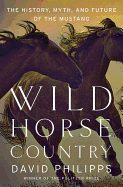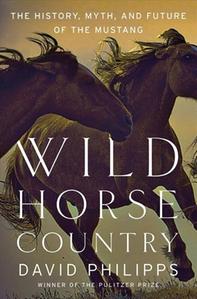
 David Philipps (Lethal Warriors), a Pulitzer Prize-winning correspondent for the New York Times, lives on the eastern slope of the Colorado Rockies. On the other side and west, to California's Sierra Nevadas, lies the Great Basin, the thinly populated land that is home to wild horse herds growing so fast that nobody knows quite what to do with them. Wild Horse Country is Philipps's illustrated investigation into the history, politics, legends and management of these storied symbols of America. Descended from strays, the wild horse "is not pedigreed. It has no stature.... It is beholden to no one. It will not be subjugated." No wonder it is the United States' only animal besides the bald eagle to be protected by specific national law--and no wonder this law has created such philosophical, financial and emotional drama.
David Philipps (Lethal Warriors), a Pulitzer Prize-winning correspondent for the New York Times, lives on the eastern slope of the Colorado Rockies. On the other side and west, to California's Sierra Nevadas, lies the Great Basin, the thinly populated land that is home to wild horse herds growing so fast that nobody knows quite what to do with them. Wild Horse Country is Philipps's illustrated investigation into the history, politics, legends and management of these storied symbols of America. Descended from strays, the wild horse "is not pedigreed. It has no stature.... It is beholden to no one. It will not be subjugated." No wonder it is the United States' only animal besides the bald eagle to be protected by specific national law--and no wonder this law has created such philosophical, financial and emotional drama.
Like a good reporter, Philipps goes where the story is. This is a place where there are "no fences, no power lines, no road signs, no roads"--a place that one Nevadan describes as "nothing but miles and miles of miles and miles." He interviews paleontologists who verified the presence of early horses in North America 50 million years ago. He describes the Spanish explorers' reintroduction of the horse in about 1500, and its adoption by Native American Indians. His research uncovers the very profitable killing of mustangs in the 1920s for Ken-L Ration dog food (marketing spokesdog: Rin Tin Tin) and perhaps the first animal rights activist, Frank Litts, who bombed the slaughterhouse "because horse slaughter was morally wrong." Similarly impassioned, Velma "Wild Horse Annie" Johnston almost singlehandedly drove the Wild Free-Roaming Horses and Burros Act through Congress in 1971. Since no story of American wild horses can ignore the writers who helped create their mystique, Philipps also explores the backdrop to Zane Grey's 40 pulp novels of the Wild West.
However, Philipps reserves more concern for the current state of these inspirational animals. The Federal Bureau of Land Management (BLM) manages the herds. With little budget and a typical bureaucratic snarl of regulations and acronyms, the BLM is trying to deal with a mustang population growing 15% a year. Philipps watches today's helicopter round-ups and interviews the BLM employees directing them. He visits fourth-generation cattle ranchers who hate both the feral mustangs and the BLM bureaucrats. He follows the post-round-up trail to the "holding" ranches in Kansas and Oklahoma, where the government pays out more than a billion dollars in board fees to their wealthy owners every year "trying to preserve a symbol of freedom... [by keeping] it in captivity."
The colorful, well-researched and well-reasoned Wild Horse Country concludes with an attempted answer to the wild horse dilemma, "something that could limit the herds without poisoning the legend." His solution is a refreshingly low-cost, simple one--cultivate the mustang's natural predator: the mountain lion. That solution, however, will need money and courageous leadership--things that the BLM and Congress seem to be sorely lacking. Without action, the United States may have more real mustangs than mustang school mascots. --Bruce Jacobs, founding partner Watermark Books & Cafe, Wichita, Kan.
Shelf Talker: Pulitzer Prize-winner David Philipps gets to the heart of the wild horse controversy with a little history, a little mystique, a little humor and a lot of solid investigation.

